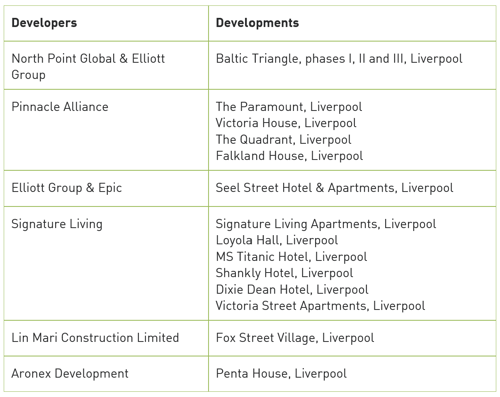Calls to ‘hold developers to account’ from Liverpool Council’s scrutiny report on fractional developments
Posted: 07/08/2020
The long awaited report from the Regeneration and Sustainability Committee of Liverpool Council has just been released. The City, and indeed much of the North West, has seen a proliferation of failed developments in recent years – many of which have been fractional developments.
The report shows that Liverpool Council’s Scrutiny Panel is disturbed by the lack of coherent advice to the public from sellers of non-traditionally funded property developments, considering this both a serious gap and a grave concern, not only in Liverpool but nationally.
David Niven, head of professional negligence and group actions at Penningtons Manches Cooper, congratulates the council on its report and welcomes its recommendations. David and his team are assisting investors to recover losses incurred through these and other failed property developments.
He observes: “Fractional ownership involves multiple unrelated parties investing in, and sharing the risk of, ownership of an asset such as real estate. One driver for this type of investment is that it enables buy-to-let owners to share the costs of maintaining property that they will not occupy themselves. There has been a proliferation of these schemes since the financial crisis of 2008.”
He continues: “The problem is that while the benefits of the investment are shared, so too are the liabilities, meaning that if schemes stall or go into administration, a large number of investors, who typically have paid deposits of up to 80%, have released money under considerable risk.”
Thousands of small investors have suffered losses due to such development failures from schemes in Liverpool and across other key cities in the UK. Among the most significant failed developments in Liverpool are:

In welcoming the report, David hopes that it will reassure investors that Liverpool Council is seeking to overcome these failures by improving its policies, procedures and oversight of the development market.
The key findings of the report include:
- Liverpool City Council has for years failed to effectively police the fractional property investment market, leading to poor quality developments and driving up land prices;
- ‘grave concerns’ over the lack of advice given to investors, and the paucity of regulatory oversight of the market;
- the buy-to-let funding model has ‘impacted…the reputation of the city’ according to the scrutiny panel made up of councillors drawn from the regeneration committee. The panel has set out recommendations to fix the problem that it would like to see brought in by the end of October;
- ‘the panel considered [the] lack of effective policing and lack of ability to hold developers to account to be highly unsatisfactory’.
- ‘where investor expectations were not realised, particularly in terms of poor quality workmanship or failure to pay promised financial returns, investors might be persuaded to cut corners with a view to maximising return, for example on rental yields, meaning that the end occupier, usually a tenant, reaped all the disadvantages’;
- ‘the absence of effective regulation and the relative ease of marketing such schemes and of attracting potential investors might well have the effect of driving up land prices as developers compete for sites for developing such schemes’;
- greater transparency is needed into how the council sells its land and property, and into the relationships between developers and the council. However the report notes that the council does not have legislative powers over the fractional model or projects that use it.
Recommendations in the report include:
- the introduction of a code of conduct to deal with developers who approach the council for endorsement or to accompany its members to events;
- due diligence including proof of funding and use of an escrow account;
- a ban on disposals of council land for developments funded by fractional or similar models;
- seeking Government funding for a pilot project to increase inspection of building sites during construction;
- the panel’s concerns were directed at the lack of effective oversight, manifested principally by potential abuse of investors, by the way that schemes are marketed, by the way that investors are advised, and the impact of poor regulatory and statutory oversight on the city’s social, environmental and economic well-being. The panel’s recommendations are targeted at better investor protection, particularly where investors are consumers, and better scheme evolution. Some recommendations require more effective regulatory oversight, others might require legislation’.
The report will go to the Regeneration Select Committee on 12 August 2020. Its recommendations will be processed and could be amended up to 31 October 2020, including by cabinet, following which there is expected to be a consultation period lasting until the end of the year.
A full copy of the report can be obtained from Liverpool Council.
 Return to news headlines
Return to news headlines


